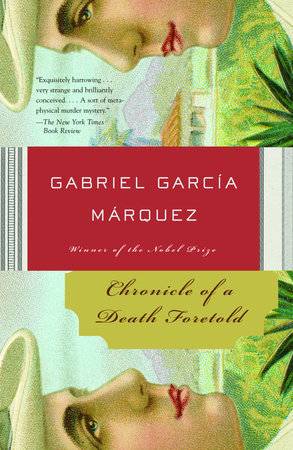Review: Gabriel García Márquez’s “Chronicle of a Death Foretold”
by Miles Raymer
It feels sad to admit that Gabriel García Márquez’s Chronicle of a Death Foretold had a repellent effect on me. In many ways, it seems like a book I should love: artful in structure, brooding in tone, and concerned with humanity’s singular knack for committing sins of stupidity. But alas, the experience was hijacked by a familiar problem I’ve previously encountered with male Latin American authors: gender politics. I found myself so disgusted with how the men and women in this story related to each other––and how they related to themselves––that I was unable to feel much empathy for any of them.
Chronicle is a fictional reconstruction of the murder of Santiago Nasar, a young man accused of “dishonoring” a young woman named Angela Vicario. When Angela’s surly new husband “returns” her to her family after discovering she is not a virgin on their wedding night, she tells the family that Nasar is the reason for her plight, at which point her brothers vow to kill him. A few short hours later, Nasar is dead––knifed to death in front of his family home and many witnesses.
This book is intended to be tragic, and it is. By the time Nasar meets his end, most of the townspeople already know the Vicario brothers are planning to kill him, but either shrug it off as not their business or fail in their attempts to help. The narrator, who recounts the story years after the fact, weaves the various accounts together in a noble attempt to reveal “an exact knowledge of the place and the mission assigned to us by fate” (96). The murder has lingered in the town’s collective consciousness, wreaking havoc on some minds and barely nudging others.
Chronicle’s tragedy is compounded––or thwarted, depending on your perspective––by the atavistic nature of the central conflict. While honor-based morality systems are hardly a thing of the past, they no longer hold sway in many parts of the world. If one is lucky enough to hail from a superior culture that does justice a different way (yes, such cultures are superior), it is hard to read about this kind of thing without a lot of eye-rolling and deep sighing. It doesn’t help that Nasar is a pig who openly says things to young girls such as, “The time has come for you to be tamed,” and is fond of cornering women in order to physically assault them (9, 13). Not exactly the kind of guy whose death I’m eager to lament, even if it was needlessly brutal and unjustified.
There’s also a fair amount of internalized misogyny that is difficult to stomach. At one point, Angela Vicario’s mother claims that “Any man will be happy with them [her daughters] because they’ve been raised to suffer” (31). This could be interpreted as a jab at men for being lousy partners, but even that wouldn’t change the degree to which this kind of thinking permeates the town culture. This is most evident in Angela Vicario’s account of why she didn’t try to hide her “impure” status from her new husband:
She recounted how her friends had instructed her to get her husband drunk in bed until he passed out, to feign more embarrassment than she really felt so he’d turn out the light, to give herself a drastic douche of alum water to fake virginity, and to stain the sheet with Mercurochrome so she could display it the following day in her bridal courtyard. Her bawds hadn’t counted on two things: Bayardo San Román’s exceptional resistance as a drinker, and the pure decency that Angela Vicario carried hidden inside the stolidity her mother had imposed. “I didn’t do any of what they told me,” she said, “because the more I thought about it, the more I realized that it was all something dirty that shouldn’t be done to anybody, much less to the poor man who had the bad luck to marry me.” (90-1)
I know it might seem petty, but passages like that can mar an entire book for me, especially when a key conflict depends on such absurd reasoning. Not only is Angela Vicario’s self-hatred awful to witness, but the narrator also becomes loathsome by characterizing her warped disposition as “pure decency.”
It’s not that I don’t understand the internal logic here or see the value in narratives that preserve and explore old ways of thinking; on the contrary, I studied honor-based moral systems in college and have revisited them again as an adult. I also recognize that Márquez is no intellectual lightweight, so I am guessing much of what ruffled my feathers was intentional commentary and cultural critique. Fine––good on Márquez for recognizing and exposing vapid forms of moral calculus. But none of that changes the reality that the book didn’t draw anything out of me, didn’t tease, please, or make me long for events to somehow have turned out differently. Rather, it felt like sticking my nose in an infected wound and suddenly wishing a quick death for a patient whose last hope is long past.
Rating: 5/10

I think I’ll be skipping this one. Thanks for the review!